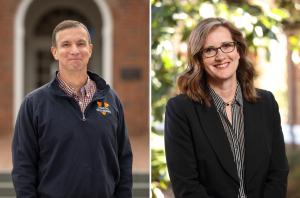
Two distinguished University of Virginia professors of chemical engineering, William S. Epling and Roseanne M. Ford, were among the 2024 fellows elected to the American Institute of Chemical Engineers. Fellow is the AIChE’s highest member level.
A Catalyst for a Cleaner Environment
Epling is the chair of the department and the Ann Warrick Lacy Distinguished Professor. He is known in academia and in industry for his work in environmental catalysis, specifically controlling regulated emissions from vehicle exhaust.
Much of his research has focused on how catalysts that are designed to reduce the amounts of emitted nitrogen oxides, carbon monoxide and hydrocarbons lose their efficiency over time. This knowledge helps in designing better, longer-lasting catalysts, which play a key role in maintaining healthy air quality by improving the efficiency of emission control systems.
After a postdoctoral research appointment at the Pacific Northwest National Laboratory and before his return to academia, Epling worked for a catalyst manufacturing company and Cummins Inc., which makes large engines. He developed expertise in catalytic converter technologies for diesel, natural gas and gasoline engines and uses these experiences to continue to inform his research.
Also a member the American Chemical Society and the North American Catalysis Society, he has served on the editorial boards of three academic journals in his field. As an AIChE member, he previously served on a regional section executive committee and as a director of the Catalysis and Reaction Engineering Division.
Exploiting Bacteria for Medicine and the Environment
Ford’s expertise is in bacterial chemotaxis — a sense of smell that bacteria use to swim toward food and away from toxins — and harnessing this behavior for applications such as environmental bioremediation or treating infectious diseases.
Recent research in her lab explores using bacteria to break down hard-to-remove hydrocarbons that are common in soil and groundwater from industrial pollution. Another project examines the growth of biofilms, bacterial colonies that form in medical and industrial settings, creating a range of environmental hazards to humans.
Combining experimental and computational methodologies to observe and model chemotaxis, the Ford lab’s approaches are innovative and collaborative across medicine, environmental engineering, and even music to develop new ways to interpret life sciences data through sound.
Ford is a longtime leader at UVA and mentor to countless students. She recently served as chair of the chemical engineering department and was the School of Engineering and Applied Science’s associate vice president for research and graduate studies for six years. She has served several visiting professorships in the U.S. and abroad, the most recent at Princeton University.
She is a fellow of the American Institute for Medical and Biological Engineering and was awarded the Cavaliers’ Distinguished Teaching Professorship, one of UVA’s top teaching awards. She also received the AIChE Women in Chemical Engineering Excellence in Mentoring Award.
Travel Fellowship Established
In other AIChE news, a Catalysis and Reaction Engineering Division Travel Fellowship has been created in honor of William Stansfield Calcott Professor of Engineering and Applied Science Robert J. Davis. The fellowship will help fund travel expenses for graduate students presenting their research at the AIChE Annual Meeting. The CRE Endowment supports students and young professionals, recognizing leadership and advancing inclusive and diverse communities.
AIChE is chemical engineering’s premier professional organization connecting 60,000 members worldwide across academia, industry and government. Election as fellow requires recommendation by the institute’s admissions committee and approval by the board of directors.